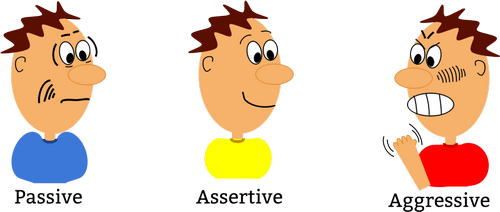The most common roles that prevent us from behaving confidently, and achieving good relationships with people are the Savior, the Persecutor, and the Victim. Entering one of these roles usually means moving to another, then to a third role. For example, in a person who is constantly at the service and helping others even more than he wants and can (Savior who saves the Victim), at one point, most often when disappointment occurs because the Victim behaves inappropriately and ungratefully, she becomes the Persecutor and starts with charges and insults, so that after this episode there would be a feeling of guilt and a transition to the role of the Victim with various apologies. WE TAKE THE ROLE OF SAVIOR: • when we do things for other people that we don’t really want to do or other people dont’t want us to do; • we do not know how to say “No” or we are afraid of distorting the image of ourselves; • we want to maintain the status of a good friend, a dedicated parent, a good person; • we believe in our labels “I am nice and polite”, “I am someone who does not resent”, “I am always available and helpful”; • when we take the responsibility of another on ourselves, that is, we do more than we should. This role is most often taken over by some important person in our life and we are very often proud of this role. Why we take on this role: • We feel like hardworking and good people when we help. • We fear that others will reject us. • We consider capable people, who are currently having problems, helpless people who are not able to take care of themselves. • We support capable people, who write off their abilities, in this attitude. • We generally underestimate the abilities of others and take a superior stance. • We are brought up to believe that we must make other people happy at all costs. • We think we are “doing good” to another person if we take responsibility for their behavior, or feelings. • For religious reasons (we believe it is our duty to help everyone). • We avoid the inconvenience associated with refusing to be of service and advocating for ourselves. It is very important to distinguish Salvation from the behavior of a Caring Man who helps others by knowing how to set healthy boundaries in relationships with other people.

A person who is the eternal Savior creates great problems for himself and others. The rescuer, due to the lack of time for himself and for rest, often feels tired, exhausted, dissatisfied. He also has high criteria towards others, criteria that he has set for himself and which he manifests in his relationships with others. Savior supports selfishness, dependence and helpless behavior in the “saved”, ie in the victim. It also deprives the “saved” of initiative and personal power, and in the end it causes a feeling of anger and repulsion in both the Savior and the “saved”. In addition, the Savior and the “saved” are caught in a relationship of interdependence or co-dependence, where the “saved” becomes very important to the Savior, as well as the “saved” to Savior, like drugs. WE TAKE THE ROLE OF PERSECUTOR when we criticize someone’s value, a person’s personality and not his behavior, with various labels, often using manipulation as a means to reach our goals. We have a superior, “I’m ok, you’re not ok” attitude. When we are in the role of the Persecutor, most often due to accumulated dissatisfaction, we are irritable and grumpy, we often insult others, ridicule them, reject them, ignore them, shout, give lectures and moralize, and constantly oppose them. We came to “pay” for the good we did to another. These are all power games to keep others under control. Possible consequences of aggressive behavior: • Prolonged aggression can cause some physical problems (high blood pressure, heart and gastrointestinal problems, etc.). • An aggressive person has a feeling that he must be constantly awake, “on guard”, develops a competitive attitude towards other people, is not receptive to the positive in others, and in relation to other people. • The person loses, or is less able to form close relationships with people, becomes lonely, or is abandoned by people. • People from the environment who are the target of an aggressive person withdraw and suffer in different ways. • After “aggressive outbursts” a person may feel guilty, ashamed and withdraw.

WE TAKE THE ROLE OF VICTIM when we write off our ability to make decisions and take care of ourselves. We allow others to lead our lives and take care of us. The victim who is the object of the Savior’s deviation from generosity, when he becomes aware that he has been “saved,” will feel humiliated and will think that he is being treated as a “social case”. Because of this, he often begins to persecute his Savior. Why we take on this role: • We believe that if we stand up for ourselves, we will act aggressively towards people. We would rather smile than take responsibility for our emotions and reactions. • We do not accept our rights. • It is easier for us to leave the responsibility to another. • We are afraid to express emotions. • We are afraid of the outcome of our assertiveness (punishment, rejection, non-acceptance). Possible consequences of passive behavior: • A person loses self-esteem and her integrity. • Prolonged inactivity can cause some physical discomfort (headaches, constant tension, depression). • A passive person’s constant need for others to accept it usually has counter-effects – other people respect her less and ignore her need

The dramatic triangle and the described roles can very often be seen in everyday life. It is not uncommon for everyone to “take” a certain role for themselves within a business team or family. And it is also quite a common situation in which one and the same person constantly switches from one role to another, feeling that something is wrong, but not finding a way to get out of this vicious circle and start functioning in a healthier way in relation to himself and others. Learning assertive communication skills and consequently increasing self-confidence make it easier to get out of these destructive roles, reduce the above negative consequences of dysfunctional behaviors and help a person recognize manipulation and psychological games played by others in order to “invite” into a dramatic triangle.


